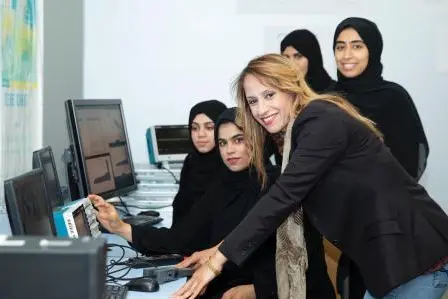PHOTO
A new project which uses artificial intelligence and machine learning approaches to predict the energy consumptions of varying applications is currently being developed at the United Arab Emirates University.
Its aim is to use the cloud computing resources in an intelligent manner, to optimize energy consumption, performance and the quality of services in data centers.
“The cloud computing platform serves as a backbone for smart cities,” said Dr Leila Ismail, Associate Professor at the College of Information Technology. “It is highly solicited by smart cities applications from big data analytics and IoT to AI applications and interactive web applications. And because it is solicited by smart cities applications, the energy consumption of its resources becomes an issue in increasing electricity bills, which is reflected on the users as a cost, and adds environmental issues.”
However, the performance of the applications is not comprised. In the project, entitled An AI-based System for Smart Cities Cloud Computing, researchers use AI and machine learning to predict the energy consumption and the performability of smart cities applications. They integrate them within an automatic framework to affect applications to the resources in a way to minimize the energy consumption without compromising performance. “In our project, we observe and learn from the behavior of different applications running on different architectures and their corresponding performance and energy consumption,” she said. “We then use these data to develop a brain for the intelligent cloud that I call the green operating system for smart cities. With our system, we can reduce clouds electricity bills, be environment friendly while not compromising the quality of services and an application’s service level agreement.”
With smart cities, the increasing number of applications and the variety of application types, a manual administrative intervention is no more effective. The new system will learn from energy and performance data generated in the cloud and learn by itself without administrative intervention. “The idea is to use cloud computing with AI to increase the power of the cloud for performance and energy savings, and decrease administrative intervention,” she added. “The project needs more experimental verification but there’s been lots of progress.”
Students at the University have been working with Dr Ismail on the project as they look to generate data and finds ways to build the cloud expert system by observing the input applications, the performance and energy outputs. “The research is important because we are using AI and it will have a big effect in our power consumption and protect the environment,” said Shaikha AlYammahi, a 21-year-old Emirati student in computer engineering. “I’m really interested in it because I love this area and it’s a new idea.”
For Rauda Al Darmaki, also 21 student in computer science, the project is vital to minimize energy consumption and increase the performance of running tasks. “We generate data by physically monitoring the different servers and collecting data so the model can learn by itself and we can observe its behavior,” she explained. “It’s the first time I join this kind of research and it’s a great experience to know more about cloud computing and the performance.”
Cloud computing is one of the trendiest topics nowadays, according to Reem Al Dhaheri, a 21-year-old Emirati student in computer science. “It’s important because we need to take care of it because smart cities run on it and we live in the world of technology,” she said. “The idea was very interesting and very promising for the future. We will be using cloud in the future and I was the first one who signed up to participate because I was amazed by the idea – it’s a new way of thinking that I never witnessed before, and it has a future in a practical way”.
-Ends-
© Press Release 2019Disclaimer: The contents of this press release was provided from an external third party provider. This website is not responsible for, and does not control, such external content. This content is provided on an “as is” and “as available” basis and has not been edited in any way. Neither this website nor our affiliates guarantee the accuracy of or endorse the views or opinions expressed in this press release.
The press release is provided for informational purposes only. The content does not provide tax, legal or investment advice or opinion regarding the suitability, value or profitability of any particular security, portfolio or investment strategy. Neither this website nor our affiliates shall be liable for any errors or inaccuracies in the content, or for any actions taken by you in reliance thereon. You expressly agree that your use of the information within this article is at your sole risk.
To the fullest extent permitted by applicable law, this website, its parent company, its subsidiaries, its affiliates and the respective shareholders, directors, officers, employees, agents, advertisers, content providers and licensors will not be liable (jointly or severally) to you for any direct, indirect, consequential, special, incidental, punitive or exemplary damages, including without limitation, lost profits, lost savings and lost revenues, whether in negligence, tort, contract or any other theory of liability, even if the parties have been advised of the possibility or could have foreseen any such damages.




















